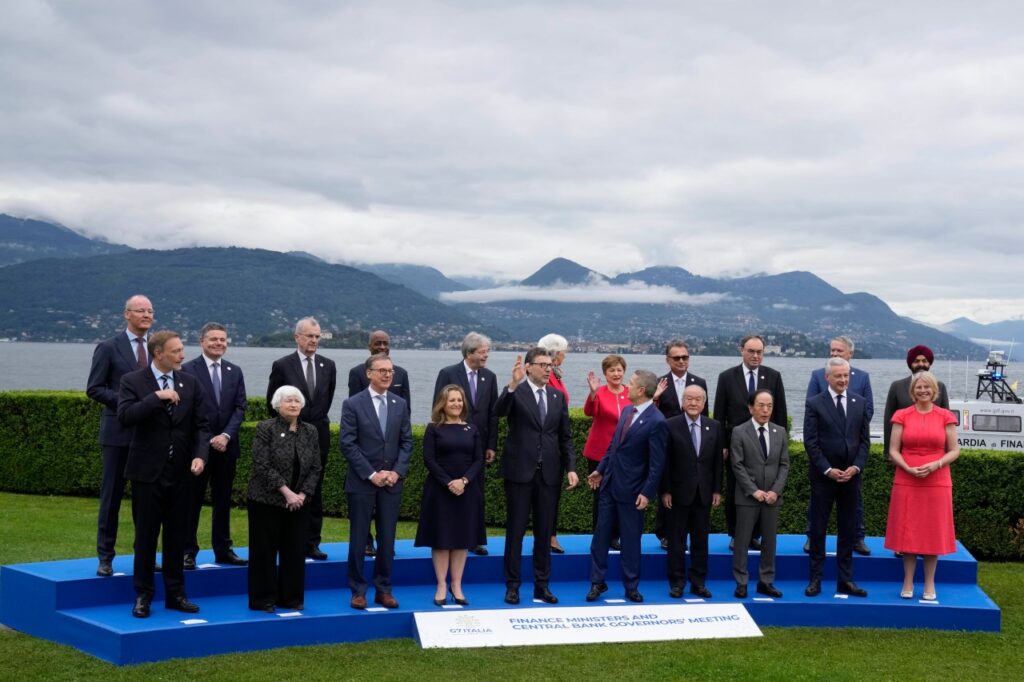David McHugh, The Associated Press
28 minutes ago

Finance ministers and central bank governors pose for a family photo during a meeting of G7 finance ministers in Stresa, northern Italy, Friday, May 24, 2024. (Photo by The Associated Press/Antonio Calani)
FRANKFURT, Germany (AP) — Finance officials from the Group of Seven advanced democracies say they are close to an agreement on a U.S. proposal to squeeze more money for Ukraine from Russian assets frozen in their countries, but ministers left it to finalize a deal before their summit in June.
“Discussions are ongoing on potential measures to forward to Ukrainian interests the significant benefits arising from the immobilization of Russian state assets,” the draft statement said, without providing details.
While progress was made at the meeting in Stresa, on Lake Maggiore in northern Italy, the final decision on what to do with the property will rest with world leaders, including U.S. President Joe Biden, at their annual G7 summit in Fasano in southern Italy next month.
The host country's finance minister, Giancarlo Giorgetti, said “progress has been made so far” but there were “legal and technical issues that must be overcome.”
“It's not an easy task, but we are working on it,” he said at a news conference after the meeting.
Ukrainian Finance Minister Serhiy Marchenko attended the final meeting on Saturday along with finance ministers and central bank governors.
The U.S. Congress has passed a bill allowing the Biden administration to seize around $5 billion in Russian assets in the United States, but European countries have a strong say in the matter as most of the $260 billion in Russian central bank assets frozen after the Feb. 24, 2022 invasion are held within their jurisdiction.
European authorities have been reluctant to seize the funds and hand them over to Ukraine as reparations for Russian destruction, citing legal concerns.
Instead, they plan to use interest accumulating on the assets, which amounts to about $3 billion a year, enough to cover only one month's financing needs of the Ukrainian government.
US Treasury Secretary Janet Yellen is pushing for borrowing secured by future interest income from frozen assets, which could give Ukraine immediate access to as much as $50 billion.
But the proposal has drawn concerns from European member states about legal complexities, the dwindling number of Western companies and individuals that still have stakes in Russia, and fears that Russia could retaliate against the Euroclear securities depository in Belgium, where most of the funds are held.
Russia has issued a decree from President Vladimir Putin authorizing the confiscation of assets of U.S. companies and individuals as compensation for Russian assets seized in the United States.
The ministers also discussed what to do about China's state-backed overproduction of green energy technologies, which the U.S. sees as a threat to the global economy. The U.S. has imposed large new tariffs on Chinese imports of electric vehicles, semiconductors, solar power equipment and medical supplies, including a 100% tariff on Chinese-made electric vehicles, aimed at protecting the U.S. economy from cheap Chinese imports.
The U.S. position has been that Chinese excess capacity is a problem not just for the U.S., but also for other G7 countries and developing countries, because China's low-cost products threaten the existence of competitors around the world.
The G7 is an informal forum that meets annually to discuss economic policy and security issues. The member countries are Canada, France, Germany, Italy, Japan, the United Kingdom and the United States. The European Union is also represented, but the EU does not hold a rotating presidency.
——
Colleen Barry contributed from Milan.


